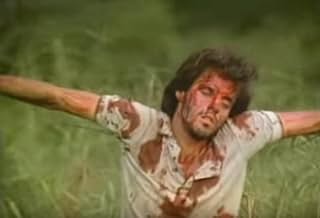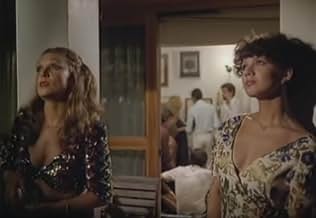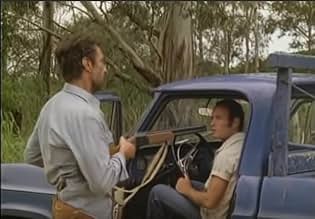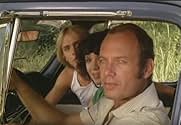Una donna provocante seduce la sua matrigna, il fratellastro e la governante, causando discordie coniugali e familiari in una fattoria.Una donna provocante seduce la sua matrigna, il fratellastro e la governante, causando discordie coniugali e familiari in una fattoria.Una donna provocante seduce la sua matrigna, il fratellastro e la governante, causando discordie coniugali e familiari in una fattoria.
Alba Valeria
- Giselle
- (as Alba Valéria)
Maria Lúcia Dahl
- Haydée
- (as Maria Lucia Dahl)
Trama
Lo sapevi?
- QuizAlba Valeria was 17 when the film was released. She was discovered by Carlo Mossy on the beaches of Ipanema.
Recensione in evidenza
"Giselle" is a pornochanchada (the way the 70s and 80s erotic films were called in Brasil - a literal translation would be porn comedy). But it is in some ways an atypical pornochanchada, because one can almost say that the film preaches free love. I'll try to explain this later. Let's go to the film.
Giselle (Alba Valéria) returns from a long stay in Europe to Brazil. She goes to her father's farm where she'll meet also her "aunt"(?), that's married to her father. The farm is run by the caretaker Angelo (Carlo Mossy). Later on Giselle's cousin Serginho (Ricardo Faria) will arrive in the farm to join the group.
Giselle is a sixteen girl who seduces everyone that crosses her way - men or women. She is sweet and full of joy and innocent in her own way. Giselle wants to take what life offers, right here, right now! Her first conquest is the caretaker Angelo (full of energy himself), and her "aunt" (Maria Lucia Dahl) is not long in following suit. And Giselle will still meet a communist militant, Ana (Monique Lafond) and Cupid and/or Eros will be busy once again. During Giselle's affair with Ana, the film becomes suddenly political! You have to see to believe it.
There will be many side stories:
1) a stallion mounts a mare - this is shown in the opening of the film and it's just to wet the appetites of the viewer and the film characters, who watch together this scene. It's just an aperitif for the things to come.
2) man loves woman (it may be more than one)
3) woman loves woman (good scenes)
4) man loves man (this is less usual in Brazilian films and in "Giselle" the relationship is not shown in a satirical manner).
5) man loves child (it is not directly shown, but clearly hinted at) - a child is leaving a man's room pulling up the trousers, and the man stands by the door watching the child go away. I'm sure that in USA there would be a great hue and cry about this scene.
6) rape.
What is amazing about "Giselle" is that it adopts a very free view on sex. The film seems to say: "Take whatever comes your way - if it gives you pleasure and hurts no one, it's alright!" Anyway, the film is very good-humoured and the actors seem to be at ease in their scenes. It's as if "Giselle" were a film made by friends. Maybe it was.
"Giselle" must have been shot fast the dubbing, in some scenes, leaves something to be desired, but the violence scenes were reasonably well-made (especially for Brazilian standards). It's certainly a pleasant film to watch: be it for its sex scenes - not graphic ones, mind you! -, or its "joie de vivre".
Giselle (Alba Valéria) returns from a long stay in Europe to Brazil. She goes to her father's farm where she'll meet also her "aunt"(?), that's married to her father. The farm is run by the caretaker Angelo (Carlo Mossy). Later on Giselle's cousin Serginho (Ricardo Faria) will arrive in the farm to join the group.
Giselle is a sixteen girl who seduces everyone that crosses her way - men or women. She is sweet and full of joy and innocent in her own way. Giselle wants to take what life offers, right here, right now! Her first conquest is the caretaker Angelo (full of energy himself), and her "aunt" (Maria Lucia Dahl) is not long in following suit. And Giselle will still meet a communist militant, Ana (Monique Lafond) and Cupid and/or Eros will be busy once again. During Giselle's affair with Ana, the film becomes suddenly political! You have to see to believe it.
There will be many side stories:
1) a stallion mounts a mare - this is shown in the opening of the film and it's just to wet the appetites of the viewer and the film characters, who watch together this scene. It's just an aperitif for the things to come.
2) man loves woman (it may be more than one)
3) woman loves woman (good scenes)
4) man loves man (this is less usual in Brazilian films and in "Giselle" the relationship is not shown in a satirical manner).
5) man loves child (it is not directly shown, but clearly hinted at) - a child is leaving a man's room pulling up the trousers, and the man stands by the door watching the child go away. I'm sure that in USA there would be a great hue and cry about this scene.
6) rape.
What is amazing about "Giselle" is that it adopts a very free view on sex. The film seems to say: "Take whatever comes your way - if it gives you pleasure and hurts no one, it's alright!" Anyway, the film is very good-humoured and the actors seem to be at ease in their scenes. It's as if "Giselle" were a film made by friends. Maybe it was.
"Giselle" must have been shot fast the dubbing, in some scenes, leaves something to be desired, but the violence scenes were reasonably well-made (especially for Brazilian standards). It's certainly a pleasant film to watch: be it for its sex scenes - not graphic ones, mind you! -, or its "joie de vivre".
I più visti
Accedi per valutare e creare un elenco di titoli salvati per ottenere consigli personalizzati
- How long is Giselle?Powered by Alexa
Dettagli
Contribuisci a questa pagina
Suggerisci una modifica o aggiungi i contenuti mancanti






















